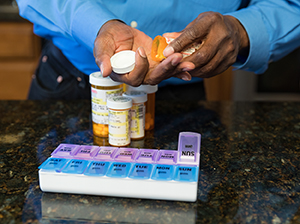Medicines for Cardiomyopathy
Medicines can help you to both feel better and stay as healthy as you can. Take your medicines exactly as instructed. Never stop taking them or change the dosage, even if you feel better, unless your healthcare provider tells you to. Be honest with your healthcare provider if you are not taking your medicines as prescribed. If you don't share this information with your healthcare provider, you may end up being admitted to the hospital for a serious condition. Work with your healthcare provider to create a medicine plan that works for you.
Common medicines
Your healthcare provider may prescribe one or more of the following medicines:
-
ACE inhibitors help blood flow more easily by relaxing blood vessels and lowering blood pressure. This lets the heart pump more blood without doing more work. These medicines also block the effects of stress hormones on the heart that can lead to further heart muscle damage. This is especially useful if you also have diabetes because it protects the kidneys from further damage. Some people who take ACE inhibitors develop a cough.
-
Angiotensin receptor blockers (ARBs) work like ACE inhibitors. These are prescribed for some people who can't take ACE inhibitors.
-
Angiotensin receptor neprilysin inhibitor (ARNI) is a combination medicine (valsartan/sacubitril) that can lower blood pressure and reduce the work of the heart. It also helps your body get rid of salt (sodium) and water to prevent buildup of excess fluid.
-
Anticoagulants help prevent blood clots. They can occur when blood pools in the heart from impaired pumping, such as when you have atrial fibrillation (AFib). You may need routine blood tests while taking these medicines to see how well they are working, get the dose adjusted, and to see if the medicine may be interacting with foods or medicines. Your healthcare team will give you full instructions based on what medicine you are prescribed.
-
Antiarrhythmics may be used to control a fast or irregular heartbeat.
-
Beta-blockers slow the heart rate and lower blood pressure. This lessens the work the heart has to do. They may also help keep the heartbeat regular and help the heart pump better. Like ACE inhibitors, beta-blockers also reduce the damaging effects of high levels of stress hormones.
-
Diuretics help rid the body of excess fluid. Having less fluid to pump makes a heart’s job easier. Getting rid of extra water can also help reduce swelling, bloating, and shortness of breath. These medicines are among the most important in treating heart failure. They help control the balance of fluid with the heart's changing ability to pump. Never skip or miss these medicines unless your healthcare provider says it's OK.
-
Digitalis and digoxin help the heart pump with more strength so it can pump more blood with each beat. Digitalis may also keep the heartbeat regular.
-
Combination medicines may be used. For example, isordil/hydralazine can lower blood pressure and reduce the work of the heart. Aldactone/eplerenone is a combination diuretic medicine that can help rid the body of excess fluid. This combination can also help protect the heart muscle from the effects of stress hormones.
Tips for taking your medicines
 |
| Use a pillbox to make keeping track of medications easier. |
-
Make taking your medicines part of your daily routine.
-
Take your medicine at the same time or times each day. Make it a habit.
-
Read and follow the directions on the prescription label.
-
Don’t run out of medicine. Order more medicine when you have a 1- to 2-week supply of pills left. Let your healthcare provider know if you are having trouble filling your prescriptions. Use the same pharmacy each time. Talk with the pharmacist about a regular schedule for your medicines to be refilled.
-
Make sure you understand any interaction your medicines may have with foods, supplements, or new prescriptions. Talk with your pharmacist and other providers for information.
-
Check with your healthcare provider about using over-the-counter medicines. Some may have a lot of sodium, which can cause fluid retention and worsening symptoms. Common cough medicines can increase blood pressure, heart rate, and strain on your heart.
-
Bring your medicine bottles with you to each healthcare provider visit. Be sure to ask questions about your medicines and make sure you understand what you are taking, why you are taking it, and when you should be taking it.
Coping with side effects
Some of the medicines you take may cause side effects. Talk with your healthcare provider about any common side effects that may occur. Side effects may include nausea, dry cough, dizziness, muscle cramps, or changes in your heartbeat. If you have any of these or other symptoms that bother you after starting a medicine, tell your healthcare provider right away. Your healthcare provider may be able to adjust your dosage or give you a different medicine. Never stop taking your medicine or change your dose on your own.
Online Medical Reviewer:
Callie Tayrien RN MSN
Online Medical Reviewer:
Stacey Wojcik MBA BSN RN
Online Medical Reviewer:
Steven Kang MD
Date Last Reviewed:
4/1/2022
© 2000-2024 The StayWell Company, LLC. All rights reserved. This information is not intended as a substitute for professional medical care. Always follow your healthcare professional's instructions.